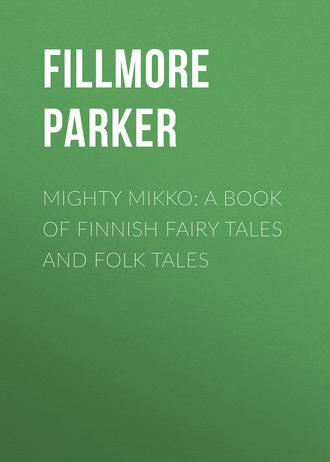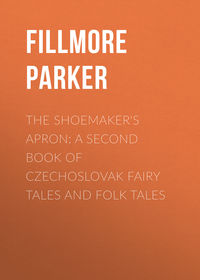 полная версия
полная версияMighty Mikko: A Book of Finnish Fairy Tales and Folk Tales
“I don’t care!” she thought to herself. “If Wetehinen sees the blood, I’ll just tell him I cut my finger by accident.”
So when Wetehinen came home, she hid the ring and pretended nothing was the matter.
After supper Wetehinen put his head in her lap and said:
“Now, my dear, scratch my head and make me drowsy for bed.”
She began scratching his head as she had many nights before but, at the first touch of her fingers, he cried out:
“Stop! You’re burning my ear! There must be some blood on your fingers! Let me see!”
He reached up and caught her hand and, when he saw the blood stains, he flew into a towering rage.
“I thought so! You’ve been in the forbidden room!”
He jumped up and without allowing her time to say a word he just cut off her head then and there with no more concern than if she had been a mosquito! After that he took the body and the severed head and threw them into the forbidden room and locked the door.
“Now then,” he growled, “she won’t disobey me again!”
This was all very well but now he had no one to keep house for him and cook and scratch his head in the evening and soon he decided he’d have to get another wife. He remembered that the farmer had two more daughters, so he thought to himself that now he’d marry the second sister.
He waited his chance and one day when the farmer was out in his boat fishing, old Wetehinen came up from the bottom of the lake and clutched the boat. When the poor old farmer tried to row back to shore he couldn’t make the boat move an inch. He worked and worked at the oars and wicked old Wetehinen let him struggle until he was exhausted. Then he put his head up out of the water and over the side of the boat and as though nothing were the matter he said:
“Hullo!”
“Oh!” the farmer cried, wishing he were safe on shore, “it’s you, is it? I wondered what was holding my boat.”
“Yes,” wicked old Wetehinen said, “it’s me and I’m going to hold your boat right here on this spot until you promise to give me another of your daughters.”
What could the farmer do? He pleaded with Wetehinen but Wetehinen was firm and the upshot was that before the farmer again walked dry land he had promised Wetehinen his second daughter.
Well, when he got home, he pretended he had forgotten his ax in the boat and sent his second daughter down to the lake to get it. Wicked old Wetehinen caught her as he had caught her sister and carried her home with him to his house at the bottom of the lake.
Wetehinen treated the second sister just exactly as he had the first, making her mistress of the house and telling her she might use every key but one. Like her sister she, too, after a time gave way to the temptation of looking into the forbidden room and when she saw the shining ring lying in the pool of blood of course she wanted it and of course when she reached to get it she dabbled her fingers in the blood. So that was the end of her, too, for wicked old Wetehinen when he saw the blood stains just cut her head right off and threw her body and the severed head into the forbidden room beside the body and head of her sister and locked the door.
Time went by and the farmer was living happily with his youngest daughter when one day while he was out chopping wood he found a pair of fine birch bark brogues. He put them on and instantly found himself walking away from the woods and down to the lake. He tried to stop but he couldn’t. He tried to walk in another direction but the brogues carried him straight down to the water’s edge and out into the lake until he was in waist deep.
Then he heard a gruff voice saying:
“Hullo, there! What are you doing with my brogues?”
Of course it was wicked old Wetehinen who had played that trick to get the farmer into his power again.
“What do you want this time?” the poor farmer cried.
“I want your youngest daughter,” Wetehinen said.
“What! My youngest daughter!”
“Yes.”
“I won’t give her up!” the farmer declared. “I don’t care what you do to me. I won’t give her up!”
“Oh, very well!” Wetehinen said, and immediately the brogues which had been standing still while they talked started walking again. They carried the farmer out into the lake farther and farther until the water was up to his chin.
“Wait – wait a minute!” he cried.
The brogues stopped walking and Wetehinen said:
“Well, do you promise to give her to me?”
“No!” the farmer began. “She’s my last daughter and – ”
Before he could say more, the brogues walked on and the water rose to his nose. In desperation he threw up his hands and shouted:
“I promise! I promise!”
So when he got home that day he said to his youngest daughter whose name was Lisa:
“Lisa, my dear, I forgot my brogues at the lake. Like a good girl won’t you run and get them for me?”
So Lisa went to the lake and Wetehinen of course caught her and carried her down to his house as he had her two sisters.
Then the same old story was repeated. Wetehinen made Lisa mistress of the house and gave her keys to all the doors and closets with the same prohibition against opening the door of the forbidden room.
“If I am mistress of the house,” Lisa said to herself, “why should I not unlock every door?”
She waited until one day when Wetehinen was away from home, then went boldly to the forbidden room, fitted the key in the lock, and flung open the door.
There lay her two poor sisters with their heads cut off. There in the pool of blood sparkled the lovely ring, but Lisa paid no heed to it.
“Wicked old Wetehinen!” Lisa cried. “I suppose he thinks that ring will tempt me but nothing will tempt me to touch that awful blood!”
Then she rummaged about, opening boxes and chests, and turning things over. In a dark corner she found two pitchers, one marked Water of Life, the other Water of Death.
“Ha! This is what I want!” she cried, taking the pitcher of the Water of Life.
She set the severed heads of her sisters in place and then with the magic water brought them back to life. She used up all the Water of Life, so she filled the pitcher marked Water of Life with the water from the other pitcher, the Water of Death. She hid her sisters each in a big wooden chest, she shut and locked the door of the forbidden room, and Wetehinen when he came home found her working at her spinning wheel as though nothing unusual had happened.
After supper Wetehinen said:
“Now scratch my head and make me drowsy for bed.”
So Lisa scratched his wicked old head and she did it so well that he grunted with satisfaction.
“Uh! Uh!” he said. “That’s good! Now just behind my right ear! That’s it! That’s it! You’re a good girl, you are! You’re not like some of them who do what they’re told not to do! Now behind the other ear! Oh, that’s fine! Yes, you’re a good girl and if there’s anything you want me to do just tell me what it is.”
“I want to send a chest of things to my poor old father,” Lisa said. “Just a lot of little nothings – odds and ends that I’ve picked up about the house. I’d be ashamed to have you open the chest and see them. I do wish you’d carry the chest ashore to-morrow and leave it where my father will find it.”
“All right, I will,” Wetehinen promised.
He was true to his word. The next morning he hoisted one of the chests on his shoulder, the one that had in it the eldest sister, he trudged off with it, and tossed it up on shore at a place where he was sure the farmer would find it.
Lisa then wheedled him into carrying up the second chest that had in it the second sister. This time Wetehinen wasn’t so good-natured.
“I don’t know what she can always be sending her father!” he grumbled. “If she sends another chest I’ll have to look inside and see.”
Now Lisa, when the second sister was safely delivered, began to plan her own escape. She pulled out another empty chest and then one evening after she had succeeded in making old Wetehinen comfortable and drowsy she begged him to carry this also to her father. He grumbled and protested but finally promised.
“And you won’t look inside, will you? Promise me you won’t!” Lisa begged.
Wetehinen said he wouldn’t, but he intended to just the same.
Well, the next morning as soon as Wetehinen went out, Lisa took the churn and dressed it up in some of her own clothes. She carried it to the top of the house and perched it on the ridge of the roof before a spinning wheel. Then she herself crept inside the third chest and waited.
When Wetehinen came home he looked up and saw what he thought was Lisa spinning on the roof.
“Hullo!” he shouted. “What are you doing up there?”
Lisa, in the chest, answered in a voice that sounded as if it came from the roof:
“I’m spinning. And you, Wetehinen, my dear, don’t forget the chest that you promised to carry to my poor old father. It’s standing in the kitchen.”
Wetehinen grumbled but because of his promise he hoisted the chest on his shoulder and started off. When he had gone a little way he thought to put it down and take a peep inside. Instantly Lisa’s voice, sounding as if it came from the roof, cried out:
“No! No! You promised not to look inside!”
“I’m not looking inside!” Wetehinen called back. “I’m only resting a minute!”
Then he thought to himself:
“I suppose she’s sitting up there so she can watch me!”
When he had gone some distance farther, he thought again to set down the chest and open the lid but instantly Lisa’s voice, as from a long way off, called out:
“No! No! You promised not to look inside!”
“Who’s looking inside?” he called back, pretending again he was only resting.
Every time he thought it would be safe to put down the chest and open the lid, Lisa’s voice cried out:
“No! No! You promised not to!”
“Mercy on us!” old Wetehinen fumed to himself, “who would have thought she could see so far!”
On the shore of the lake when he threw down the chest in disgust he tried one last time to raise the lid. Instantly Lisa’s voice cried out:
“No! No! You promised not to!”
“I’m not looking inside!” Wetehinen roared, and in a fury he left the chest and started back into the water.
All the way home he grumbled and growled:
“A nice way to treat a man, always making him carry chests! I won’t carry another one no matter how much she begs me!”
When he came near home he saw the spinning wheel still on the roof and the figure still seated before it.
“Why haven’t you got my dinner ready?” he called out angrily.
The figure at the spinning wheel made no answer.
“What’s the matter with you?” Wetehinen cried. “Why are you sitting there like a wooden image instead of cooking my dinner?”
Still the figure made no answer and in a rage Wetehinen began climbing up the roof. He reached out blindly and clutched at Lisa’s skirt and jerked it so hard that the churn came clattering down on his head. It knocked him off the roof and he fell all the way to the ground and cracked his wicked old head wide open.
“Ouch! Ouch!” he roared in pain. “Just wait till I get hold of that Lisa!”
He crawled to the forbidden room and poured over himself the water that was in the pitcher marked Water of Life. But it wasn’t the Water of Life at all, it was the Water of Death, and so it didn’t help his wicked old cracked head at all. In fact it just made it worse and worse and worse.
Lisa and her sisters were never again troubled by him nor was any one else that lived on the shores of that lake.
“Wonder what’s become of wicked old Wetehinen?” people began saying.
Lisa thought she knew but she didn’t tell.
LOG
There was once a poor couple who had no children. Their neighbors all had boys and girls in plenty but for some reason God didn’t send them even one.
“If I can’t have a flesh and blood baby,” the woman said one day, “I’m going to have a wooden baby.”
She went to the woods and cut a log of alder just the size of a nice fat baby. She dressed the log in baby clothes and put it in a cradle. Then for three whole years she and her husband rocked the cradle and sang lullabies to the log baby.
At the end of three years one afternoon, when the man was out chopping wood and the woman was driving the cows home from pasture, the log baby turned into a real baby! It was so strong and hearty that by the time its parents got home it had crawled out of the cradle and was sitting on the floor yelling lustily for food. It ate and ate and ate and the more it ate the faster it grew. It wasn’t any time at all in passing from babyhood to childhood, from childhood to youth, and from youth to manhood. From its beginnings it was known in the village as Log and never received any other name.
Log’s parents knew from the first that Log was destined to be a great hero. That was why he was so strong and so good. There was no one in the village as strong as he nor any one as kind and gentle.
Now just at this time a great calamity overtook the world. The Sun and the Moon and the Dawn disappeared from the sky and as a result the earth was left in darkness.
“Who have taken from us the Sun and the Moon and the Dawn?” the people cried in terror.
“Whoever they are,” the King said, “they shall have to restore them! Where, O where are the heroes who will undertake to find the Sun and the Moon and the Dawn and return them to their places in the sky?”
There were many men willing to offer themselves for the great adventure but the King realized that something more was needed than willingness.
“It is only heroes of exceptional strength and endurance,” he said, “who should risk the dangers of so perilous an undertaking.”
So he called together all the valiant youths of the kingdom and tested them one by one. He had some waters of great strength and it was his hope to find three heroes the first of whom could drink three bottles of the strong waters, the second six bottles, and the third nine bottles.
Hundreds of youths presented themselves and out of them all the King found at last two, one of whom was able to take three bottles of the strong waters, the other six bottles.
“But we need three heroes!” the King cried. “Is there no one in all this kingdom strong enough to drink nine bottles?”
“Try Log!” some one shouted.
All the youths present instantly took up the cry:
“Log! Log! Send for Log!”
So the King sent for Log and sure enough when Log came he was able to drink down nine bottles of the strong waters without any trouble at all.
“Here now,” the King proclaimed, “are the three heroes who are to release the Sun and the Moon and the Dawn from whoever are holding them in captivity and restore them to their places in the sky!”
He equipped the three heroes for a long journey furnishing them money and food and drink of the strong waters, each according to his strength. He mounted them each on a mighty horse with sword and arrow and dog.
So the three heroes rode off in the dark and the women of the kingdom wept to see them go and the men cheered and wished that they, too, were going.
They rode on and on for many days that seemed like nights until they had crossed the confines of their own country and entered the boundaries of an unknown kingdom beyond. Here the darkness was less dense. There was no actual daylight but a faint grayness as of approaching dawn.
They rode on until they saw looming up before them the towers of a mighty castle. They dismounted near the castle at the door of a little hut where they found an old woman.
“Good day to you, granny!” Log called out.
“Good day, indeed!” the old woman said. “It’s little enough we see of the day since the Evil One cursed the Sun and handed it over to Suyettar’s wicked offspring, the Nine-Headed Serpent!”
“The Evil One!” Log exclaimed. “Tell me, granny, why did the Evil One curse the Sun?”
“Because he’s evil, my son, that’s why! He said the Sun’s rays blistered him, so he cursed the Sun and gave him over to the Nine-Headed Serpent. And he cursed the Moon, too, because at night when the Moon shone he could not steal. Yes, my son, he cursed the Moon and handed her over to Suyettar’s second offspring, the Six-Headed Serpent. Then he cursed the Dawn because he said he couldn’t sleep in the morning because of the Dawn. So he cursed the Dawn and gave her over to Suyettar’s third offspring, the Three-Headed Serpent.”
“Tell me, granny,” Log said, “where do the three Serpents keep prisoner the Sun and the Moon and the Dawn?”
“Listen, my son, and I will tell you: When they go far out in the Ocean they carry with them the Sun and the Moon and the Dawn. The Three-Headed Serpent stays out there one day and then returns at night. The Six-Headed Serpent stays two days and then returns, and the mighty Nine-Headed Monster does not return until the third night. As each returns a faint glow spreads over the land. That is why we are not in utter darkness.”
Log thanked the old woman and then he and his companions pushed on towards the castle. As they neared it they saw a strange sight which they could not understand. One half of the great castle was laughing and rocking as if in merriment and the other half was weeping as if in grief.
“What can this mean?” Log cried out. “We had better ask the old woman before we go on.”
So they went back to the hut and the old woman told them all she knew.
“It is on account of the dreadful fate that is hanging over the King’s three daughters,” she said. “Those three evil Monsters are demanding them one by one. To-night when the Three-Headed Serpent comes back from the Ocean he expects to devour the eldest. If the King refuses to give her up, then Suyettar’s evil son will devour half the kingdom, half of the castle itself, and half the shining stones. O that some hero would kill the monster and save the princess and at the same time release the Dawn that it might again steal over the world!”
Log and his fellows conferred together and the one they called Three Bottles, because his strength was equal to three bottles of the strong waters, declared that it was his task to fight and conquer the Three-Headed Serpent.
In the castle meanwhile preparations for the sacrifice of the oldest princess were going forward. As the King sewed the poor girl into a great leather sack, his tears fell so fast that he could scarcely see what he was doing.
“My dear child,” he said, “it should comfort you greatly to think that the Monster is going to eat you instead of half the kingdom! Not many princesses are considered as important as half the kingdom!”
The princess knew that what her father said must be true and she did her best to look cheerful as they slipped the sack over her head. Once inside, however, she allowed herself to cry for she knew that no one could see her.
The sack with the princess inside was carried down to the beach and put on a high rock near the place where Suyettar’s sons were wont to come up out of the water.
“Don’t be frightened, my daughter!” the King called out as he and all the Court started back to the castle. “You won’t have long to wait, for it will soon be evening.”
Log and his companions watched the King’s party disappear and then Three Bottles solemnly drank down the three bottles of strong waters with which his own King had equipped him. As he was ready to mount his horse, he handed Log the leash to which his dog was attached.
“If I need help,” he said, “I’ll throw back my shoe and do you then release my dog.”
With that he rode boldly down to the beach, dismounted, and climbed up the rock where the unfortunate princess lay in a sack. With one slash of the sword he ripped open the sack and dragged the princess out. She supposed of course that he was the Three-Headed Serpent and at first was so frightened that she kept her eyes tightly shut not daring to look at him. She expected every minute to have him take a first bite and, when minutes and more minutes and more minutes still went by and he didn’t, she opened her eyes a little crack to see what was the matter.
“Oh!” the princess said.
She was so surprised that for a long time she didn’t dare to take another peep.
“You thought I was the Three-Headed Serpent, didn’t you?” a pleasant voice asked. “But I’m not. I’m only a young man who has come to rescue you.”
The princess murmured, “Oh!” again, but this time the “Oh!” expressed happy relief.
“Yes,” repeated the young man, “I am the hero who has come to rescue you. My comrades call me Three Bottles and you, too, may call me that. And while we are waiting for the Serpent to come in from the Ocean I wish you would scratch my head.”
The princess wasn’t in the least surprised at this request. Heroes and monsters and fathers alike seemed always to want their heads scratched.
So Three Bottles stretched himself at the princess’ feet and put his head in her lap. He settled himself comfortably and she scratched his head while he gazed out over the dark Ocean waiting for the Serpent to appear.
At first there was nothing to break the glassy surface of the water. They waited and at last far out they saw three swirling masses rolling landward.
“Quick, my princess!” Three Bottles cried. “There comes the Monster now! Get you down behind the rock and hide there while I go meet the creature and chop off his ugly heads!”
The princess, quivering with fright, crouched down behind the rock and Three Bottles, mounting his horse, rode boldly down to the water’s edge awaiting the Serpent’s coming.
It came nearer and nearer in long easy swirls, slowly lifting its three scaly heads one after another.
As it approached shore it sniffed the air hungrily.
“Fee, fi, fo, fum!” it muttered in a deep voice, repeating the magic rime it had learned from its evil mother, Suyettar:
“Fee, fi, fo, fum!I smell a Finn! Yum! Yum!I’ll fall upon him with a thud!I’ll pick his bones and drink his blood!Fee, fi, fo, fum!Yum! Yum!”“Stop boasting, son of Suyettar!” Three Bottles cried. “You’ll have time enough to boast after you fight!”
“Fight?” repeated the Serpent as if in surprise. “Shall we fight, pretty boy, you and I? Very well! Blow then with your sweet breath, blow out a long level platform of red copper whereon we can meet and try our strength each with the other!”
“Nay,” answered Three Bottles. “Do you blow with your evil breath and instead of red copper we shall have a platform of black iron.”
So the Serpent blew and on the iron platform that came of his breath Three Bottles met him in combat. Back and forth they raged, Three Bottles striking right and left with his mighty sword, the Serpent hitting at Three Bottles with all his scaly heads and belching forth fire and smoke from all his mouths. Three Bottles whacked off one scaly head and at last a second one, but he was unable to touch the third.
“I shall have to have help,” he acknowledged to himself finally, and reaching down he took one of his shoes and threw it over his shoulder back to his comrades who were awaiting the outcome of the struggle. Instantly they loosed the dog which bounded forward to its master’s assistance and soon with the dog’s help Three Bottles was able to dispatch the last head.
He was faint now with weariness and his comrades had to help him back to the old woman’s hut where he soon fell asleep.
Night passed and Dawn appeared. A great cry of relief and thanksgiving went up from all the earth.
“The Dawn! The Dawn!” people cried. “God bless the man who has released the Dawn!”
Only at the castle was there sorrow still.
“My poor oldest daughter!” the King cried with tears in his eyes. “It was my sacrifice of her that has released the Dawn!”
Then he called his slaves and gave them orders to gather up his daughter’s bones and to bring back the leather sack.
“We shall need it again to-night,” he said. He wiped his eyes and for a moment could say no more. “Yes, to-night we shall have to sew up my second daughter and offer her to the Six-Headed Serpent, him that holds captive the Moon. Otherwise the monster will devour half my kingdom, half the castle, and half the shining stones. Ai! Ai! Ai!”
But the slaves when they went to the high rock on the seashore found, not the princess’ bones, but the princess herself, sitting there with her chin in her hand, gazing down on the beach which was strewn with the fragments of the Three-Headed Serpent.






